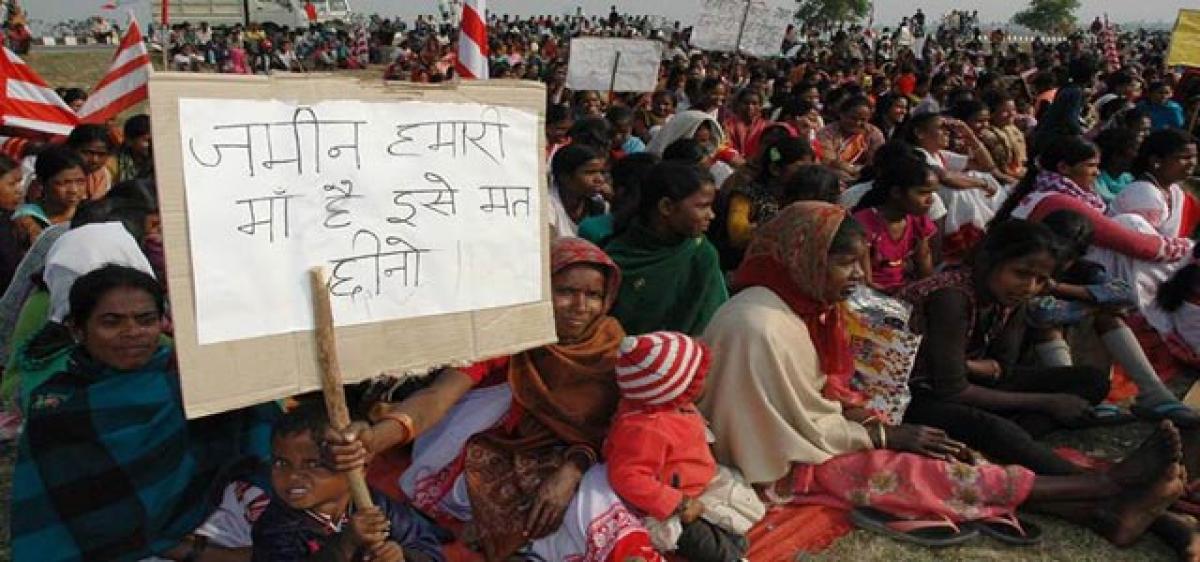Live
- Supreme Court issues notice on PIL seeking directions to integrate legal education, self-defence training into school curriculum
- Bengal school jobs case: Arpita Mukherjee granted bail; new HC Bench to look into Partha Chatterjee's plea
- Working to provide social security for gig and platform workers: Govt
- Bangladesh records 11 dengue deaths, toll rises to 459
- Vocera Raises $500K from Y Combinator to Revolutionize Voice AI Testing and Evaluation
- GQG Partners Refuses to Sell Adani Stocks Despite Bribery Scandal and 26% Loss
- Bihar: Four persons including girl injured in post bypolls violence in Gaya
- Dharmasthala Dharmadhikari Enters Record Book
- BJP to Review By-election Losses in State Meet
- Activist Alleges CPCB Cover-up on Endosulfan in Kasaragod
Just In

Effective implementation of forest rights laws, particularly in Maoist-hit areas, and socio-economic uplift of tribals will be the main focus of the Tribal Ministry in the year to come.
Agenda for 2017
Effective implementation of forest rights laws, particularly in Maoist-hit areas, and socio-economic uplift of tribals will be the main focus of the Tribal Ministry in the year to come. Losing of land and livelihood because of "poor" implementation of the Forest Rights Act is one of the prime reasons for the surge of Maoist insurgency in different parts of the country, according to Union Tribal Minister Jual Oram.
Seeking active cooperation of states to ensure effective implementation of the act to curb Left-wing extremism, Oram says his ministry has asked at least 10 states including Chhattisgarh, Jharkhand, Odisha, Telangana, Maharashtra, West Bengal and Bihar to review all rejected claims for land titles since the legislation came into force on December 31, 2007.
"There is reluctance especially on part of the State forest departments to give forest rights to tribal communities."In the coming year, we will strive to ensure that states implement the Scheduled Tribes and Other Traditional Forest Dwellers (Recognition of Forest Rights) Act effectively so that forest dwellers get the rights to the forest land and resources, where their forefathers settled centuries ago and also to prevent them from getting influenced by Maoists," Oram said.
Observing that there were "a high number of rejections" of land titles, he said scrutiny had revealed that "majority of those (rejections) were based on invalid and trivial grounds". Uttar Pradesh reported the highest rejection rate at 80.03 per cent followed by West Bengal (68.56 per cent), Maharashtra (64.88), Madhya Pradesh (60.74) and Chhattisgarh (59.03).
The ministry has identified 163 priority districts: 94 of them having more than 50 per cent of tribal population and 69 districts having at least 25 per cent of tribal population. "The Ministry will focus on development of health, education, skill development, agriculture and employment in these districts in the coming year.
Improvement in these spheres will also prevent them from getting influenced by Maoists. "The Ministry is collaborating with the Ministry of Skill Development and Entrepreneurship to build a framework suited to the need and requirement of tribal people. We plan to set up one multi-skilling institute in each of these districts to cater to the development and promotion of sustainable livelihood avenues in tribal areas through entrepreneurship and skill-upgrade," says Oram.
The ministry will also aim at ensuring that money allotted to states under various tribal welfare schemes reaches the actual beneficiaries and for that officials from National Commission for Scheduled Tribes and Tribal Affairs Ministry will visit various remote areas to personally ascertain the benefits accrued to tribals. Post-matric scholarships for ST students will be released through DBT mode to ensure transparency and fast delivery.
The ministry is also reviewing the Ekalavya Model Residential School (EMRS) scheme, says Oram. "One of the bottlenecks has been availability of teachers in these schools. This issue has been taken up with states and we will see whether to expand the programme or not," he says adding that during the current financial year 20 new Ekalavya Model Residential Schools were opened and their total number has reached 227.
Among health-related activities, about 1.1 crore children and youth have been screened across the country for sickle cell anemia, so far. The ministry also supported construction of primary health centres and community health centres in tribal areas and training educated tribal girls and women to be paramedics in another attempt to improve primary healthcare delivery.
Oram, however, points out that availability of doctors, paramedics and equipment is much less in tribal areas as people do not want to work there due to lower levels of comfort. Tribal communities comprise over 8 per cent of the country's population of 1.25 billion. There are over 80 million tribals and non-tribals dependent on the country's resource-rich forests, which make up 65 million hectares.

© 2024 Hyderabad Media House Limited/The Hans India. All rights reserved. Powered by hocalwire.com







